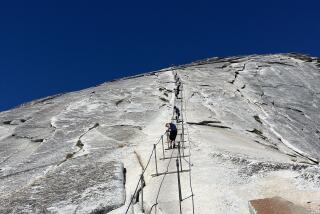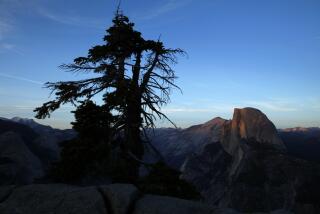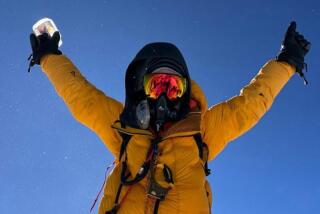Enough Heart to Sustain a Dream
- Share via
YOSEMITE NATIONAL PARK — Kelly Perkins, who has climbed several of the world’s best-known peaks since a heart transplant 10 years ago, began her toughest ascent yet on Sunday: the sheer, nearly 3,000-foot-high face of El Capitan.
Perkins, 43; her husband Craig, 44; three expert mountaineers; and a photographer-filmmaker started what’s expected to be five days of vertical climbing and camping on the massive granite monolith that towers over Yosemite Valley.
“I’m nervous. It’s more daunting than it’s pretty today,” Perkins said as she adjusted her climbing harness and clipped it to a rope dangling from a bolt more than 100 feet above her, for the first of more than 30 “pitches” she must complete to reach the top.
“Right now it’s a little scary,” the slight woman added. “But once we’re on the wall, everything will fall into place. We’ll get into our groove.”
The Perkinses, from Laguna Niguel, have climbed Half Dome in Yosemite, Mt. Whitney in California’s Southern Sierra, Mt. Kilimanjaro in Tanzania, Japan’s Mt. Fuji, the Matterhorn in Switzerland and New Zealand’s Mount Rolling Pin. Their goal is to raise awareness of organ donation.
Those ascents were difficult -- Perkins was admitted to a hospital after climbing Half Dome 10 months after her 1995 heart transplant -- but none had the technical difficulty of the El Capitan climb.
Their route will take them through a natural formation known as the Heart, about halfway up the face.
The symbolism of the formation for someone with a new heart made the choice an easy one, said Perkins, who has added blood donation to the organ donation she has promoted in her previous climbs.
“This was two years in the planning, much more preparation than we’ve done before,” said Craig Perkins. “I can’t believe we’re actually doing it.”
As Perkins completed her first pitch, her husband, hooking up his harness, said, “I’m just going to follow and try to keep up with her.”
Although Perkins, 5 feet, 2 inches tall and 103 pounds, is as strong now as she ever was, she faces problems that other mountaineers don’t have to deal with. Transplanted hearts lack nerves connecting them to the brain, which means Perkins’ heart doesn’t know when her muscles need more oxygen. She suffers severe shortness of breath until she can establish a pace.
Setting a pace was easier on her earlier mountain climbs. Perkins said the stop-and-go pattern of big-wall climbing -- pulling herself up one pitch and then waiting for the other climbers -- presents new challenges.
Perkins’ first heart started failing in 1992 after the couple returned from a backpacking trip in Europe. She contracted a virus that made her so weak that her husband had to carry her around their home. Her new heart, implanted at UCLA Medical Center, came from a woman in her 40s who died in a fall from a horse.
With the consent of the donor’s family, the Perkinses scattered the woman’s ashes in a ceremony atop Mt. Fuji. The family is supportive of the El Capitan effort, Kelly Perkins said.
More to Read
Sign up for The Wild
We’ll help you find the best places to hike, bike and run, as well as the perfect silent spots for meditation and yoga.
You may occasionally receive promotional content from the Los Angeles Times.






